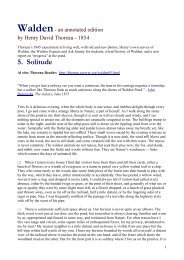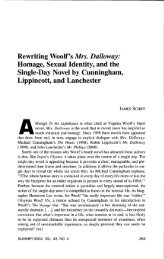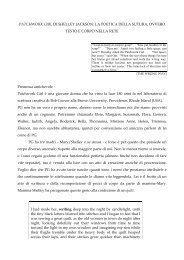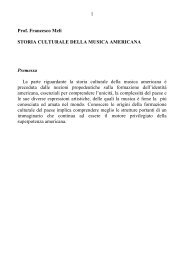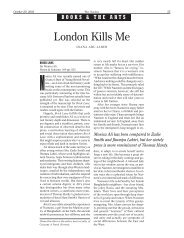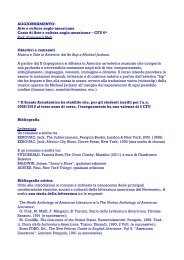Exciting Tales of Exotic Dark India - Paola Carbone
Exciting Tales of Exotic Dark India - Paola Carbone
Exciting Tales of Exotic Dark India - Paola Carbone
Create successful ePaper yourself
Turn your PDF publications into a flip-book with our unique Google optimized e-Paper software.
286 Journal <strong>of</strong> Commonwealth Literature<br />
the pressures <strong>of</strong> the global marketplace”. 46 In reaction to Mukherjee’s<br />
critique, Chandra, in a perceptive and polemical examination <strong>of</strong> what<br />
he dubbed “The Cult <strong>of</strong> Authenticity” strikes back at what he calls the<br />
“anxiety about the anxiety <strong>of</strong> <strong>India</strong>nness”, that is, the accusation that “a<br />
real reality that was being distorted by ‘Third World cosmopolitans’”.<br />
In what has become a classic reference text in this debate, the novelist<br />
argues that <strong>India</strong>n “cultural commissars” (for the most part critics such<br />
as Mukherjee) traffic in authenticity; in doing so, they act as gatekeepers<br />
<strong>of</strong> <strong>India</strong>nness, availing themselves <strong>of</strong> the ability to “identify a ‘Real<br />
<strong>India</strong>’” and monitoring which aesthetic practices are “properly <strong>India</strong>n”<br />
and which are not. 47 He quite straightforwardly resists the concept <strong>of</strong> an<br />
authentic <strong>India</strong>n literature springing from “a deep, essential connection<br />
to a ‘real’ <strong>India</strong>nness”. On this point, it is worth quoting aspects <strong>of</strong> his<br />
argument at some length:<br />
To write about <strong>India</strong> in English is at best a brave failure, and at worst a<br />
betrayal <strong>of</strong> <strong>India</strong>n “realities.” [...]<br />
Indo-Anglian writers write for a Western audience. [...]<br />
Indo-Anglian writers make too much money. [...]<br />
A lot <strong>of</strong> Indo-Anglian writers live abroad, so they are disconnected from<br />
<strong>India</strong>n realities, and are prey to nostalgia; and besides, the bastards are<br />
too comfortable over there and don’t have to face Delhi traffic jams and<br />
power cuts and queues for phones and train tickets and busses, and so<br />
they don’t suffer like us and so they can’t possibly be virtuous enough to<br />
be good artists. 48<br />
The publication <strong>of</strong> The White Tiger once again resurrected the debate<br />
over authentic literary representations <strong>of</strong> <strong>India</strong> by <strong>India</strong>n English writers,<br />
and markedly so after the novel was awarded the Booker. Critiques<br />
focusing on the “inauthenticity” <strong>of</strong> Adiga’s novel particularly questioned<br />
the capability <strong>of</strong> a highly-educated author (who studied English literature<br />
at Columbia and Oxford universities and who is a former correspondent<br />
in <strong>India</strong> for Time magazine) to grasp the experience <strong>of</strong> the <strong>India</strong>n<br />
underclass. Specifically, some reviewers accused the novelist <strong>of</strong> devising an<br />
“inauthentic” lead character. For instance, Akash Kapur pointed out that<br />
Balram’s “credulousness and naïveté <strong>of</strong>ten ring false”, and proceeded to<br />
conclude that, “[i]n their surfeit <strong>of</strong> emblematic detail”, a few sequences<br />
in the novel “reduce the characters to symbols”. 49 Adiga had the stated<br />
intention <strong>of</strong> writing a novel about, in his own phrase, the “invisible men<br />
within <strong>India</strong>”, that is, about individuals coming from a cultural and<br />
social background very different from his own. 50 Nonetheless, he would<br />
inevitably have to face the customary critical accusation <strong>of</strong> fabricating<br />
narratives about the poor <strong>of</strong> <strong>India</strong> chiefly for an affluent and/or western<br />
Downloaded from jcl.sagepub.com at Senate House Library, University <strong>of</strong> London on November 29, 2010



